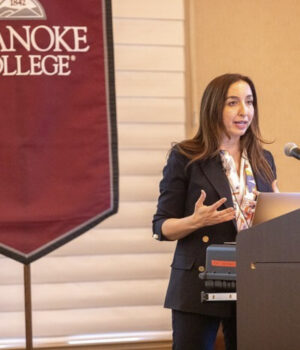by Hannah Guanti
As we reach the end of women’s history month, it is important to showcase the stories of women worldwide. On March 27, Roanoke College hosted Dr. Leila Hanafi, an international lawyer, who emphasized the importance of women’s voices during times of conflict and peace. Dr. Hanafi currently serves as senior staff at the World Bank Group and teaches at the George Washington University School of Law. Her previous positions include legal advisor for non-governmental organizations (NGOs), foreign governments, and the United Nations. Her experience and knowledge offered a thought-provoking analysis of women’s roles both in conflict zones and the United States.
Dr. Hanafi began her speech by countering the idea that women are solely victims of war. Even though women and girls experience disproportionately higher levels of violence and discrimination than their male counterparts, these women are not merely victims. Throughout the talk, Dr. Hanafi highlighted women’s experiences as leaders, activists, sole providers for their families, and much more. The shift away from portraying women solely as victims is crucial to ensure that their voices are heard.
Furthermore, Dr. Hanafi spoke about the importance of including women in major conversations. In the majority of war-torn nations and international organizations working to combat these problems, women are being left out of the conversation, even though they are disproportionately impacted. Dr. Hanafi highlighted the three critical needs of women: basic services, protection from violence, and accountability of those in power to uphold women’s rights.
Finally, Dr. Hanafi shared the strategies that she has implemented with great success. The main strategy was an implementation of gender-specific responses. These responses include both men and women’s perspectives on gender-based issues. She specified that including men in the conversation is crucial to the success of any gender-based action.
The most significant takeaway from Dr. Hanafi’s talk was that youth is a significant force for advocacy and change. As college students, we have the capability and knowledge to work against things we want changed. Specifically, the United States has not ratified CEDAW or the Convention on the Elimination of Discrimination Against Women. Dr. Hanafi found this to be one problem with the United States’ gender-based policies. To combat this issue, she advocated for students and community members to urge politicians, local representatives, and people in power to support CEDAW or any other government action that they care about.




